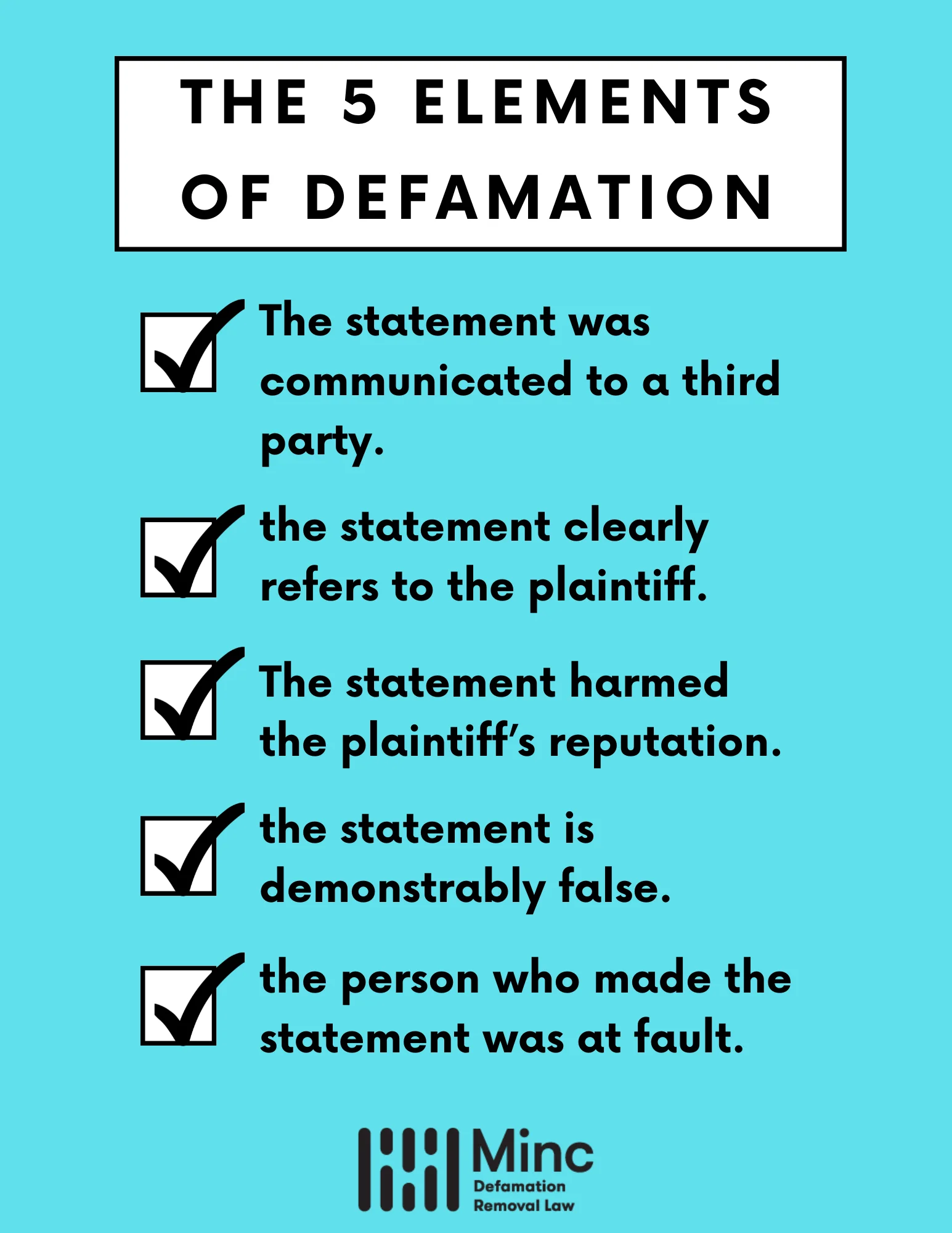
- Originally Published on May 8, 2025
The Elements of Defamation
Before taking legal action for defamation, it is important to understand if your situation meets the legal requirements. This article will help you understand what makes a strong defamation case and how to evaluate your circumstances.
In simple terms, defamation requires five key elements: (1) a false statement, (2) shared with others, (3) that clearly identifies you, (4) harms your reputation, and (5) was made carelessly or deliberately. Below, Minc Law addresses what each of these means for your potential case and how courts evaluate these criteria.
What Is Defamation?
Defamation happens when someone shares false information that damages your reputation. According to the Legal Information Institute, this harmful communication can occur in two main forms:
- Spoken false statements (slander)
- Written false statements (libel)
Today, many defamation cases involve online content, such as false statements on social media, review sites, or forums. This type of defamation spreads quickly and can be particularly damaging in our digital world, where information is permanent and accessible to vast audiences.
The impact of defamation can be serious for anyone, from private individuals to business owners to public figures. False statements can damage your personal relationships, hurt your business prospects, and cause significant emotional distress. Many victims report long-lasting effects that extend beyond the initial publication of the defamatory content.
Through legal action, victims can prove statements were false, stop further spread of lies, and receive compensation for the harm caused. The legal system recognizes both economic damages (such as lost business) and non-economic damages (such as emotional distress and reputational harm).
The Five Essential Elements of a Defamation Claim
While defamation laws vary somewhat by state, most jurisdictions require these five basic elements to establish a valid claim. Understanding each component will help you assess the strength of your potential case.
1. The Statement Must Identify You
For a defamation claim to succeed, the false statement must clearly refer to you. This does not necessarily mean you must be mentioned by name, though direct naming is the most obvious form of identification.
A statement might identify you if it:
- Uses your title or position (like “the manager at XYZ Store”)
- Includes enough details that people who know you would recognize you are the subject
- Contains information that only applies to you within a certain context
- Is understood by others to be about you based on surrounding circumstances
Most often, this element is easy to establish. People making defamatory statements typically make it clear who they are talking about, either by using names or providing enough context that makes identification obvious. However, complications can arise in situations where statements refer to groups or when contextual clues are ambiguous.
Courts will consider whether reasonable people who know you would understand that the statement refers to you specifically. In cases where identification is not obvious, you may need to provide evidence that third parties actually recognized you as the subject of the statement.
2. The Statement Must Be False
Not all negative or harmful statements qualify as defamation – the statement must be factually false. Truth is an absolute defense against defamation claims, regardless of how damaging the information might be.
For example, if someone writes, “I think Dr. Johnson is unfriendly and I did not like his approach,” this is an opinion that cannot be proven true or false. However, if they write, “Dr. Johnson performed surgery without a license” or “Dr. Johnson deliberately overcharged me for services never provided,” these are factual claims that can be verified.
The distinction between opinion and fact is crucial in defamation cases. Pure opinions, no matter how harsh, generally do not qualify as defamation. Courts often look at whether a statement implies undisclosed facts or would be understood by readers as asserting actual facts.
Statements that begin with phrases like “I think” or “In my opinion” are not automatically protected if they imply false factual assertions. Context matters significantly in this analysis.
3. The Statement Must Be Communicated to Others
For defamation to occur, the false statement must be “published” – meaning someone other than you and the person making the statement must have seen or heard it. This third-party communication is essential to a defamation claim.
This requirement is usually straightforward in today’s world, especially with online content that many people can view. A single email, social media post, or verbal statement to just one other person can satisfy this element.
The timing and extent of publication can affect important aspects of your case, including:
- When the legal time limit for filing begins (statute of limitations)
- How extensive the damages might be
- Whether others who shared the statement might also be liable
- Jurisdictional questions about where a lawsuit can be filed
It is important to document when and how the defamatory statement was published, including preserving copies of written communications or recordings when legally obtained.
4. The Person Making the Statement Must Be At Fault
To win a defamation case, you must show the person who made the statement failed to exercise proper care regarding its truth or falsity. The level of fault required depends on who you are and varies significantly based on your public status.
- For private individuals: You generally need to prove the person was negligent – they should have checked if the statement was true but did not take reasonable steps to verify accuracy.
- For public figures (celebrities, politicians, etc.): You must prove “actual malice” – that the person either knew the statement was false or showed reckless disregard for whether it was true or false.
The distinction between private and public figures can be complex. Some individuals may be “limited purpose public figures” who have voluntarily thrust themselves into particular public controversies. Courts consider factors such as access to media channels for rebuttal and voluntary involvement in public issues.
Proving actual malice often requires evidence about what the person knew or believed when making the statement. This might include their private communications, research they conducted (or failed to conduct), or inconsistencies in their story. This evidence typically becomes available during the legal discovery process after a lawsuit is filed.
5. The Statement Must Harm Your Reputation
Finally, you must show that the false statement damaged your reputation. Some statements are considered so inherently harmful that damage is automatically assumed. These are called “defamatory per se” and typically include:
- False accusations of criminal activity
- False claims about sexual misconduct or moral impropriety
- False statements about having a contagious or loathsome disease
- False allegations that harm your professional reputation or business standing
For other types of statements (“defamatory per quod”), you may need to provide specific evidence of how your reputation was damaged, such as lost business opportunities, damaged relationships, or emotional distress. This might include documentation of financial losses, testimony from others about changed perceptions, or evidence of psychological impact.
The extent of reputational harm affects the potential compensation you might receive. Courts consider factors such as how widely the statement was shared, the credibility of the source, and whether the false information continues to be accessible.
Infographic: The 5 Elements Required to Prove Defamation

When to Consult a Defamation Attorney
If you believe someone has defamed you, consulting with an experienced defamation attorney can help determine if you have a strong case.
Our attorneys have handled hundreds of defamation claims in courts across the country. We understand both the legal requirements and the practical challenges involved in these cases. Our approach combines legal expertise with compassionate guidance throughout the process.
Defamation cases often involve complex legal analyses and strategic considerations. The sooner you consult with an attorney, the better positioned you will be to preserve evidence and protect your rights. Many states have relatively short statutes of limitations for defamation claims, making timely action important.
If you are experiencing harm from false statements about you or your business, contact us at (216) 373-7706 or by filling out the form below. We will help you understand your options and develop a strategy tailored to your specific situation.
Get Your Free Case Review
Fill out the form below, and our team will review your information to discuss the best options for your situation.
This page has been peer-reviewed, fact-checked, and edited by qualified attorneys to ensure substantive accuracy and coverage.


